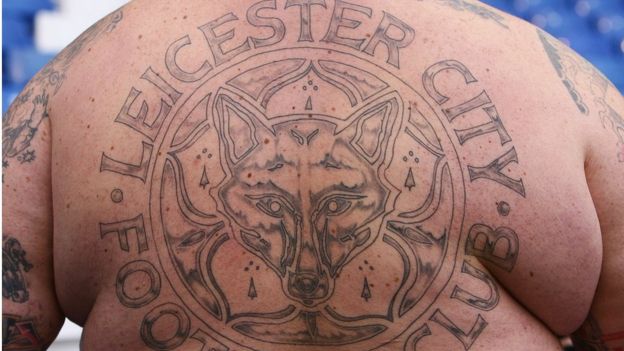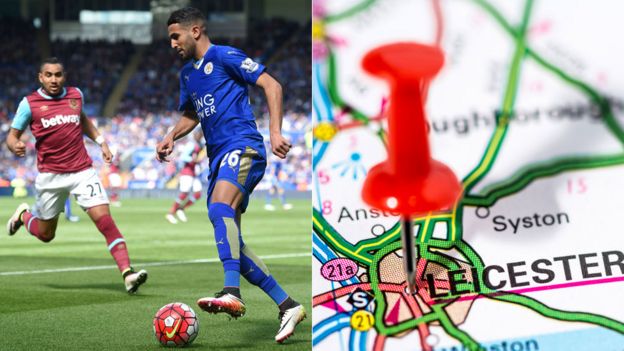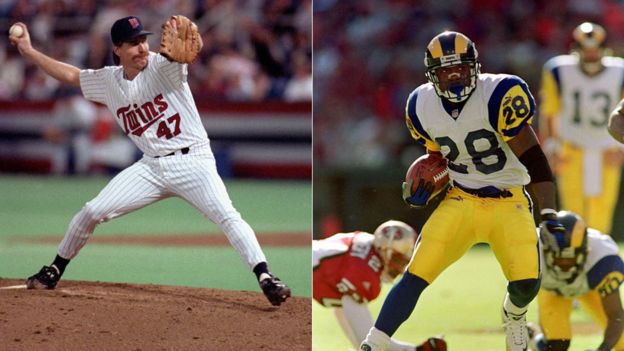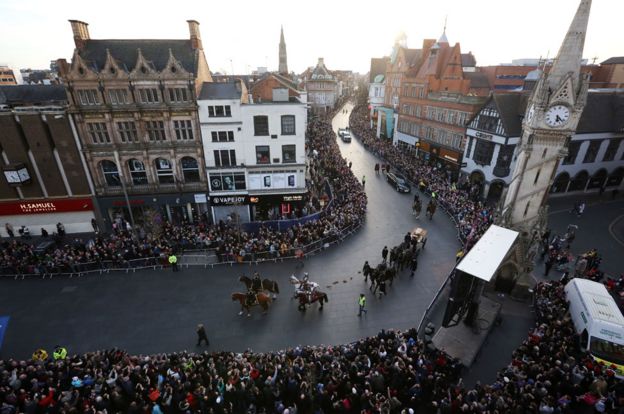Explaining the Leicester City story to Americans
- 22 April 2016
- Magazine
 Getty Images
Getty Images
If Leicester City win the Premier League, it will be one of the most captivating British sport stories in years. But how does a football-mad Englishman living in the US explain its importance to Americans?
"Lie-kester."
"No, Leicester."
"Less-ester?"
"No, Leicester. As in Lester."
"Oh. Why is it pronounced like that?"
Trying, and failing, to explain the mystery of English phonetics can be a daily task for Brits living in the US.
But when it comes to the Leicester City story, the how-to-say is not the only part that's lost in translation.
For those not yet aware, a small, unfashionable team based in England's East Midlands has somehow stormed the Premier League.
With four games left, Leicester City are five points ahead of anyone and barring a collapse, on course for their first top-flight league title in their 132-year history.
This team were in the third tier of English football in 2009, and after climbing to the top division, they spent months last season in bottom place.
They weren't just out of fashion, they were a byword for failure.
 Getty Images
Getty Images
In 2008, when they were relegated to the equivalent of the third division, the Guardian newspaper wrote:
The crowds still filed in, greeting each new season with optimism, but all too soon the realisation dawned that the cheers from the stands were for nothing - everything the club once embodied had been hollowed out from the inside, leaving only a desiccated blue and white husk.
As recently as 18 months ago, the chairman of Marseille said he would be a "sucker" to take an interest in signing any Leicester City player.
And their Algerian star player Riyad Mahrez says he thought they were a rugby club when they first expressed an interest in him.
 Getty Images
Getty Images
Should they win English football's most prestigious prize, some say the feat would be the most unlikely event in the history of team sports. Globally.
Bookmakers' odds on them winning the Premier League were 5,000 to one last summer. So it was five times more likely that Hugh Hefner would declare himself a virgin.
For a British sports fan living in the US, there's a natural inclination to share this footballing fairytale with friends. This, after all, is a story as much about the human spirit as it is about scoring goals.
Writing in The Players' Tribune, their manager Claudio Ranieri said: "This is a small club that is showing the world what can be achieved through spirit and determination. Twenty-six players. Twenty-six different brains. But one heart."
But mention Leicester City to American friends who don't closely follow English football and a blank look is the stock response. Or worse, a nod and a smile. Even from sports fans.
It's understandable. My eyes would probably glaze over if someone tried to enthuse me about, say, the San Diego Padres being on a winning streak.
So how to put it in terms that my American friends would understand? Has there ever been an American Leicester?
For help, I turned to team mates of mine on the football pitches of Shaw, a neighbourhood of Washington where every Friday night, the replica shirts of Liverpool, Chelsea and Arsenal worn by locals give the scene a semi-English flavour.
"Oakland As in baseball?" suggests Drew, a tough-tackling Wisconsinite, referring to the famous Oakland Athletics team under Billy Beane who used analytics to overcome more glamorous opponents, winning 20 games in a row in 2002.
 Rex Features
Rex Features
Nice story but they didn't win the World Series at the end of that run, which is the equivalent of what Leicester could achieve in the weeks ahead.
Next?
"OK, how about Minnesota Twins?" says Joe, who supports West Ham.
"In 1991, they went from bottom of the American League West to winning 95 games on their way to a World Series title.
"And in gridiron in 1999, the St Louis Rams accomplished a similar feat, following a last-place finish in '98 with a championship of their own the very next year. "
Both good examples of an amazing one-season turnaround, but for teams with pedigree that's admirable, not historic.
 Getty Images
Getty Images
There are structural reasons why the Premier League / US sport comparisons are imperfect.
There is no promotion or relegation in NFL or baseball, so a smaller team can't rise up through the ranks like Leicester has, in a way that pitches David against Goliath.
And the NFL operates a more level playing field than the Premier League, through a salary cap and by giving the weaker teams first pick of the best college players.
In English football, the reverse happens - the rich clubs tighten their grip on success because a higher placed finish gets a bigger cash reward and therefore they buy the better players. It's a virtuous circle of success feeding money feeding success.
As a consequence, only five teams have won the Premier League since it was set up in 1992. In that period, 14 teams have won the Super Bowl.
That's what makes Leicester's potential feat on a comparative shoestring so remarkable, breaking into a rich elite. When they beat Manchester City recently, they overcame a squad that cost 15 times their own.
If Leicester was in the US, it might be...
 iStock
iStock- Wichita, Kansas, similar population (roughly 375,000)
- New Orleans, Louisiana, similar diversity (Leicester is majority non-white, 55%)
- Belle Fourche, South Dakota, similar location (the geographical centre of England is Fenny Drayton in Leicestershire)
So if it hasn't happened in the US, what WOULD be the nearest thing to a Leicester triumph?
"The idea of Leicester winning the Premiership would be like the Cleveland Browns winning the Super Bowl - unthinkable, and seemingly impossible," says Jeff Maysh, a British writer (and Spurs fan) who is based in Los Angeles.
"In history there have been a couple of comparable performances in college basketball, which is more akin to a team winning the FA Cup on a lucky run, rather than Leicester's dominance in the league."
Grant Wahl of Sports Illustrated thinks there's no direct comparison but the nearest would be if an AA (third division) baseball team managed to find its way - magically - to the major leagues and then won the World Series.
He puts Leicester's success down to the implosion of several of the big English clubs like Chelsea, some astute Leicester signings and new manager Ranieri.
After a troubled summer when the last manager resigned after a Thai brothel scandal involving his son, the club turned to a man whose Greece side had just lost to the Faroe Islands. Suffice to say, hopes were not high.
Now Ranieri is a folk hero in the East Midlands and there's even talk of a knighthood from the Queen.
There is also an English king's hand in their success, if you believe in superstition. Ever since Richard III's body was dug up from a car park in Leicester and restored to the city's cathedral a year ago, their fortunes have turned around.
 Getty Images
Getty Images
The Very Reverend David Monteith of Leicester Cathedral has said that the re-interment added to the sense of civic pride.
"History has been buried and now it's revealed in all kinds of different ways, not least in the [football] match."
The Leicester story is so rich that sex scandals in the Far East and royal influence from beyond the grave are mere footnotes.
But back in Shaw, my footballing team mates have drawn a blank in trying to give it a US context.
"There really isn't an American sports analogy to Leicester," says Andrew, a Liverpool fan from Baltimore. "It has to be the most stunning underdog story in sports history."
Perhaps the best comparison lies not in sport but in politics, he says.
"Everyone said Donald Trump would falter in December but here we are in April wondering how he's defied the odds."
Subscribe to the BBC News Magazine's email newsletter to get articles sent to your inbox.
Magazine
Threatened with death for working on TV
- 29 April 2016
- Magazine
What is the most expensive object on Earth?
- 29 April 2016
- Magazine












No comments:
Post a Comment
Please leave a comment-- or suggestions, particularly of topics and places you'd like to see covered